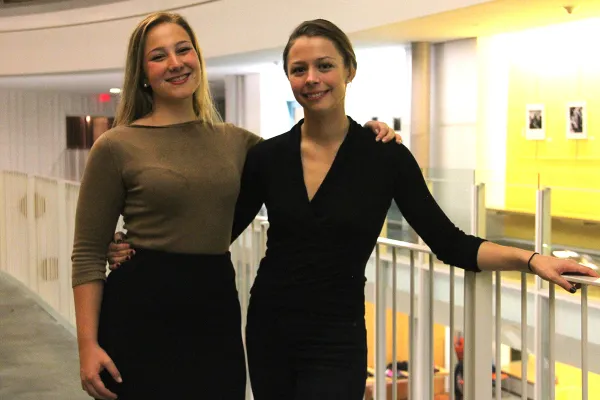Crossing Party Lines: Student-Led Bipartisan Coalition Aims for Positive Political Debate
Campus Life

Published October 30, 2015
Smith juniors Tessa Meyer and Katie Hitchcock-Smith like to say they are leading a group of “not like-minded individuals” on campus.
The two students—who are friends and fellow government majors—are founders of the Smith College Bipartisan Coalition, a new campus organization dedicated to bringing students of diverse political views together to deepen their understanding of current issues.
“We want to facilitate a place where conversations aren’t colored by partisan bias,” says Meyer.
“We are trying not to focus so much on political identity as on the views themselves,” adds Hitchcock-Smith.
The two students are an example of the bipartisanship they say is in too short supply across the nation.
Meyer, who started her college career as a Democrat, is now a Republican and a volunteer adviser to U.S. Senator Marco Rubio’s campaign for the GOP presidential nomination. Hitchcock-Smith is a Democrat who worked on Massachusetts Attorney General Maura Healey’s successful election campaign last year.
The difference in their political leanings hasn’t hurt their friendship, they say—in part because party labels don’t explain all of their views.
“For instance, I am far more Democratic on abortion than I am on taxation,” Meyer notes.
Exposure to opposing viewpoints is important for anyone interested in government or politics, Hitchcock-Smith says.
“The idea of our meetings is not to sway anyone’s view” towards a particular opinion, she explains. “We want to provide an opportunity for a discussion that either confirms what you think or gets you to think differently.”
The coalition meets on the first and third Monday of each month for discussion of a current issue. To help spark conversation at the start of each session, group members usually watch video clips of public figures expressing varying opinions on issues.
Meetings so far this semester have covered immigration and women’s health. The group’s next regular gathering, where the topic will be Common Core standards for public education, will be held Monday, Nov. 2, at 7:30 p.m. in Campus Center 102.
The coalition has also co-hosted presidential debate-watching parties with the campus Republican and Democratic clubs that have drawn packed audiences. An events calendar on the group’s website lists campaign rallies, speeches and other politically related activities at Smith and the Five Colleges.
The idea to form a bipartisan organization grew out of learning experiences during Meyer and Hitchcock-Smith’s first years at Smith.
When Meyer entered college, she says she “noticed there was not a lot of political dialogue on campus that strayed from the liberal. I made it a goal to get involved with the Republicans of Smith and I found out how hard it was to have a different opinion.”
For Hitchcock-Smith, the controversy that occurred after International Monetary Fund Director Christine Lagarde withdrew as Smith’s 2014 commencement speaker, sparked a desire for more dialogue on difficult issues.
“A lot of people were upset that she wasn’t coming,” Hitchcock-Smith says. “In forming this group, we wanted to challenge the whole idea of people being afraid to speak up or hear another side of an argument.”
The two friends expected to face difficulties in attracting participants when they launched the coalition this fall.
“Instead, what we have seen are people who are excited and are showing up to meetings again and again,” Meyer says. “We’re offering an answer to a problem people had noticed.”
One of those new members, Annabel Utz ’18, is now the coalition’s social media coordinator. (The group is on Twitter @SmithBipartisan and Facebook at Smith College Bipartisan Coalition).
Utz says she was drawn to the group because, like many Smithies, she is still formulating her political views and wanted a place to explore ideas with her peers.
“I don’t necessarily lean all right or all left,” says Utz, who is considering majoring in government. “Going to the meetings is a great way to educate myself about important social issues, hear opinions from both sides or just talk things out.”
Utz says the atmosphere at group meetings is supportive.
“There’s no judgment,” she says. “It’s about trying to get progress to happen rather than staying in your Democratic or Republican bubble.”
Meyer emphasized that group discussions—while designed to be open-ended—are also respectful.
“We want to make a distinction that racist and homophobic views are not political,” she says. “They are fueled by hatred and we don’t condone them.”
The two founders hope Smith’s new coalition can be a model for fostering constructive political dialogue at other colleges.
“Our goal is to have a bipartisan group on every campus contributing to free speech,” Hitchcock-Smith says.
Smith juniors Tessa Meyer (left) and Katie Hitchcock-Smith, founders of the Smith College Bipartisan Coalition, say political differences don't get in the way of their friendship. Photo by Leah Henry '17.